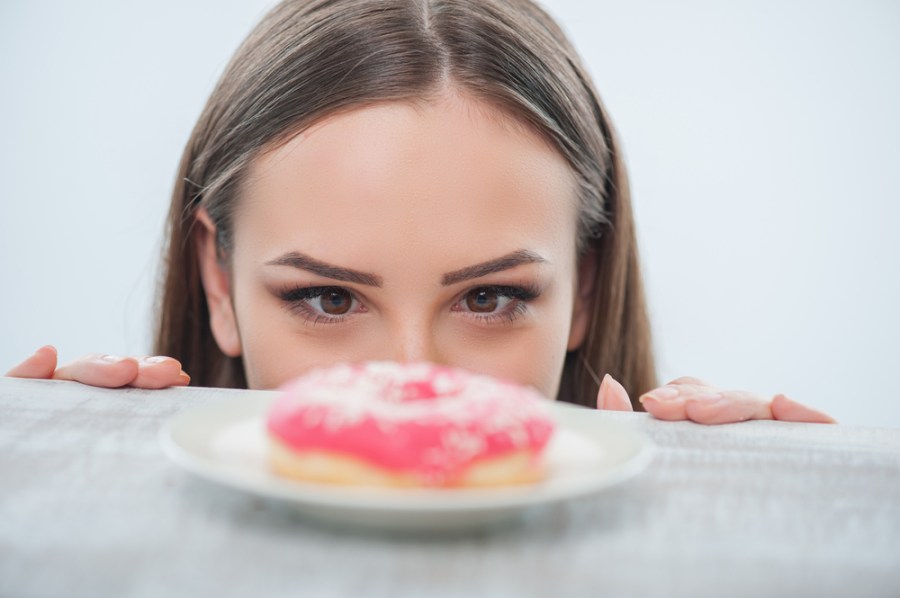What if we told you that it’s not a lack of willpower that’s causing you to reach for unhealthy foods, but an imbalance in your life causing junk food cravings? Discover what could be missing and how to fix your emotional eating habits.
We’re all guilty of succumbing to a less-than-healthy foodie treat every now and then – after all, there’s a reason for the phrase ‘comfort food’. But if you regularly respond to life’s ups and downs by turning to a tub of ice cream or a bottle of wine, it could mean that you’re putting your head in the sand(wich) when it comes to your emotions.
‘Emotional eating affects so many of us,’ says Mel Wells, health and eating coach and author of Hungry For More (£12.99, Hay House.) ‘I’m fascinated by what leads us to do this. We think it’s our body telling us to eat, but often it’s our mind creating cravings, and telling us to avoid something that makes us feel uncomfortable or sad.’
Mel’s philosophy is that unhealthy eating habits are a symptom of a problem elsewhere, and that you need to explore to identify what it is you’re using food to replace or avoid. Tune in to you There are of course times in your life when you’ll eat even though you’re not hungry (birthday cake, anyone?) but it’s worth tuning in to the reason if you’re regularly over-eating. Emotional eating has been linked to weight gain, binge eating and low self-esteem in various scientific studies, and it can be caused by a range of feelings.
Stress in particular is linked to a change in eating patterns, and a higher tendency to eat high fat, high sugar foods, according to one American study. Exhaustion is often a factor too – the reward centres of the brain in sleep-deprived people are much more likely to react to photos of unhealthy food than in those who are well-rested, according to one study from Columbia University.
‘As humans, we instinctively want to move away from pain and towards pleasure,’ says Mel. ‘Food is one of the things we engage with the most in day-to-day life, and it’s the easiest pleasure to indulge in.’
The good news is that once you’re ready to tackle these behaviours, it’s completely possible to change. After all, Mel, who struggled with disordered eating including bulimia and extreme diets for many years, did it herself, and with countless clients subsequently. But, as with anything worth doing, there’s no quick fix.
What do your cravings mean?
It may be that, as a child, you learned from your family that food makes you feel better. Pre-school children whose mothers eat emotionally ate more snacks than other children, according to a 2010 study. So these may be habits you’ve had for many years that will take time to relearn.
There’s nothing wrong with emotional eating in itself, but if it’s a pattern that’s causing you pain, and you want to get to the root of it rather than trying yet another diet, you need to get curious about yourself. Start to look at the patterns around your emotional eating and you’ll unearth some clues.
If you’re wolfing down chocolate every day during your lunch break without really tasting it, perhaps you’re feeling stressed about your job. Or maybe you’re turning to wine every evening because you’re arguing a lot with your partner and it relaxes you. You might reach for crisps when you’re feeling lonely because you don’t see your friends enough, or munch on biscuits when you’re frustrated and trying to solve a knotty problem.
‘It’s not a case of needing more willpower, even though that’s what we’re constantly taught,’ says Mel. ‘It’s about a particular area or areas in your life where you aren’t feeling fulfilled. It’s the romantic relationship, family issue or job that needs to change.’ Change your relationship with life, and your relationship with food will naturally change for the better too.
Be kind to yourself when observing these behaviours – it might actually help you cut down. When women were given donuts to taste test, those who were given a lesson in self-compassion beforehand ended up eating less, in a US study. So don’t judge yourself for your eating habits, you’re trying to learn from them, not beat yourself up about them.
How to stop emotional eating
When you start to examine the feelings behind your eating, you might discover that really allowing yourself to feel your emotions by having a good cry or talking to a loved-one will do the trick. Or it could be that you’re eating out of boredom and need to inject some fun back into your life by trying a hobby or going out with friends. It could even be that your life is too full and busy because you’re caring for others, and by carving out some regular ‘me-time’ for yourself, your eating habits will start to calm down.
Whether it’s finding a purpose that makes your heart sing, expressing your creative side, exploring spirituality, or just experiencing more joy and pleasure in your life, finding ‘the gap’ that you’re filling with food doesn’t have to be scary – it can make your life happier and richer.
‘We often look to food to heal us,’ says Mel. ‘But of course things which make us truly happy include love, relationships, fun, creativity and a feeling of belonging.’ Starting to identify which areas of your life are out of balance is a challenging but rewarding journey that can help put emotional eating at the bottom of your priorities.
How to identify emotional hunger
- Comes on suddenly, physical hunger is more gradual.
- Craves specific (usually unhealthy) foods, whereas physical hunger can be satisfied with various things.
- Is never satiated – you won’t feel full even when your stomach is. l Often results in mindless, fast eating without really tasting
Mel’s top tips for discovering what your cravings mean
You can become more aware of the feelings that drive you to eat. Write down your observations about yourself to help identify habits.
- Write down what you’re feeling when you turn to food – it may be one thing or several. Ask yourself ‘am I feeling this craving in my body or in
my mind?’ - Try to trace back what caused the feeling, whether it’s being bored at work, arguing with a friend, or something else.
- Ask yourself ‘is there a way that I can treat what’s at the root of this feeling?’ It could be something small like going for a walk, calling a friend, or spending five minutes daydreaming.
- Now read: The health problems your tongue is trying to tell you
- The incredible benefits of raw food









